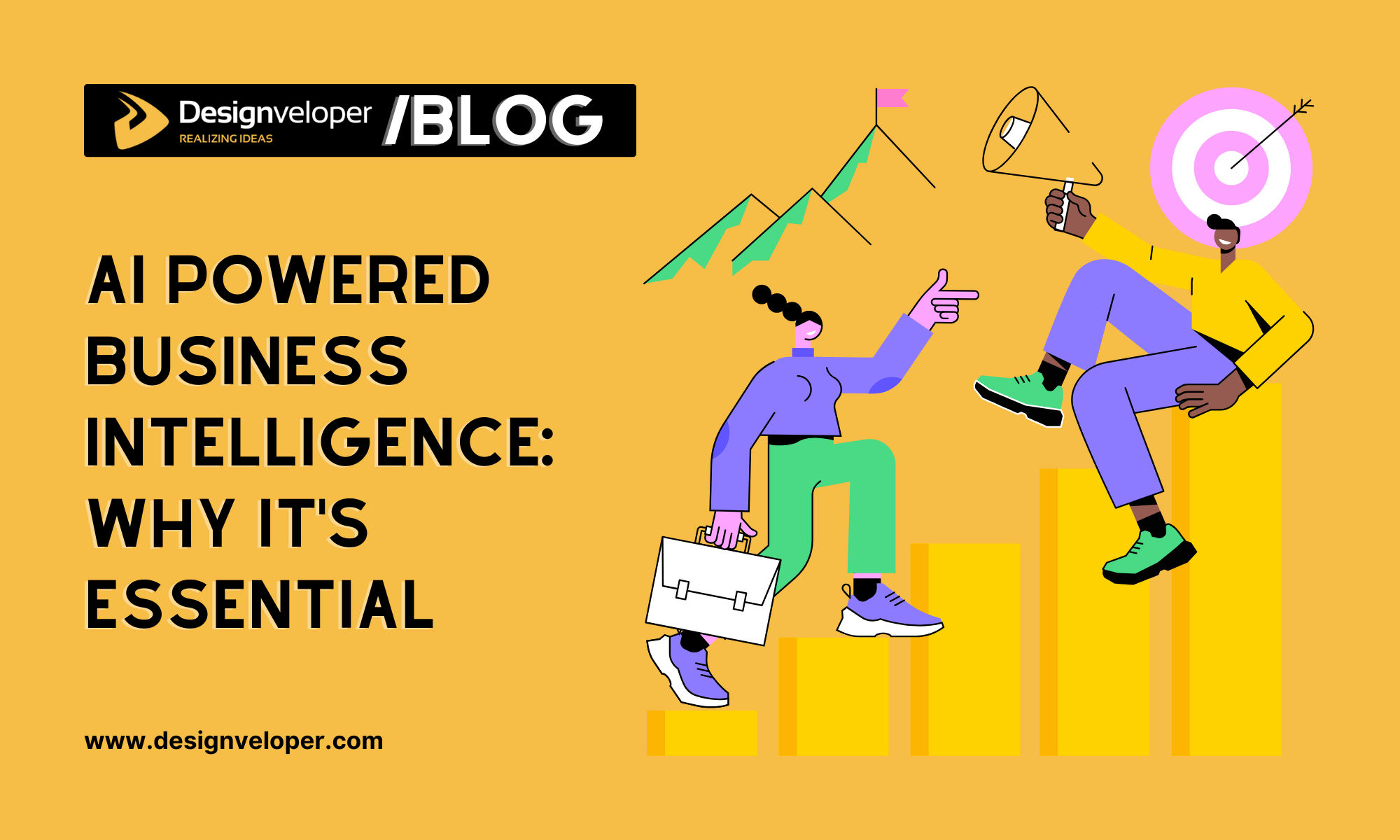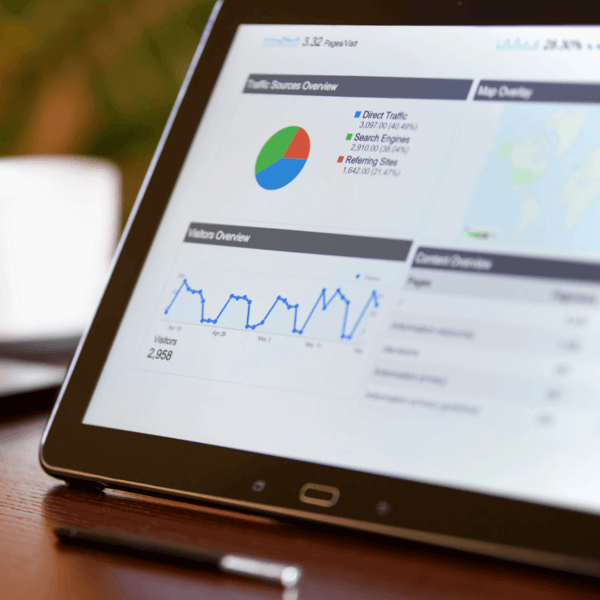AI Powered Business Intelligence: Why It’s Essential for Modern Enterprises

Modern enterprises are being transformed by AI powered business intelligence (BI). According to a recent report, the global AI market is expected to touch $1.34 trillion by 2030 with a CAGR of 21.9%. Such rapid growth demonstrates just how prominent the role of AI will play in business operations. Use of AI powered BI tools have enabled many companies to cut operational costs by 30% and increase customer engagement by 42%.
For example, Salesforce Einstein, an AI powered CRM has improved sales efficiency by 40%! Equally, robotic process automation tool UiPath has helped firms cut by more than 50% the amount of manual work. The examples shown here highlight the practical add value to business intelligence systems if AI is embedded into them.
Businesses need to dig into the complex data provided by AI powered BI, to stay competitive. According to reports from RingCentral’s 2025 Trends, 70–72% of companies have adopted or are trying AI across numerous use cases. But this is an ongoing trend, as AI is expected to become a strategic necessity for businesses from across the world.
To summarize, before we head into the main sections of this article from us at Designveloper, AI powered Business Intelligence is an essential tool for contemporary enterprises striving to raise their efficiency, improve their decision making and fuel innovation. Engaging AI driven BI tools helps companies discover new opportunities and seek sustainable growth.
The Role of AI in Business Intelligence
Modern enterprises are being transformed with AI powered business intelligence (BI). With the help of sophisticated algorithms and machine learning, businesses can achieve deeper insights, faster decisions and stay ahead of the game.
According to a McKinsey’s recent report, 72 percent of a business is adopting AI in 2024, compared to 50 percent a couple of years ago. The rapid adoption is in part driven by the measured benefits AI has introduced, such as cost reduction and revenue increases. The global AI market is also expected to achieve $1.34 trillion by 2030, a compound annual growth rate (CAGR) of 36.6% between 2023 and 2030.

Organizations using AI in business intelligence, according to the same McKinsey report, are realizing tremendous improvements in both decision making and efficiency. A report by IBM also highlights another area where AI will play a crucial role in making data analysis suddenly democratisable, enabling non technological users to access powerful analyses through natural language interfaces and automated data preparation.
For example, AI powered BI companies like Salesforce and UiPath are on the lead. Salesforce Einstein powered by AI functionally integrates AI into Salesforce’s CRM system that is designed to provide predictive analytics and personalized experiences from customer data. Meanwhile, UiPath is a company that enables robotic process automation (RPA) for businesses to automate their repetitive tasks and enhance operational efficiency.
How AI Enhances Traditional Business Intelligence Tools
AI powered business intelligence (BI) tools are radically transforming how businesses make decisions and analyze data. Traditional BI tools can enhance efficiency, effectiveness and decision making, once they are integrated with AI technologies.
Real-Time Data Processing
With AI, businesses are able to process data real time, giving them up to the minute insights. However, this is crucial for industries where the timely information can lead to a big impact, e.g. finance, healthcare.
Predictive Analytics
BI tools support predictive analytics with the help of AI by working with historical data to forecast future trends. It allows businesses to learn how things will evolve on the market and decide ahead of time.
Automated Data Preparation
AI does the boring stuff of getting one’s data ready — cleaning, organizing, etc. It thus frees up important time for analysts to work on the more strategic tasks.
Natural Language Processing.
NLP enables users to use natural language queries to interact with data, as is done in AI powered BI tools. This enables non technical users to do the data analysis.
Enhanced Visualization
AI creates informative and interactive charts and graphs. Users can better understand complicated data and quickly see the patterns.
The Integration of Machine Learning Algorithms and Data Analytics
AI-powered business intelligence is transforming how enterprises operate. Machine learning algorithms and data analytics play a crucial role in this transformation. Here’s how:
Enhanced Data Analysis
They’re good at analyzing loads of data very quickly and accurately. Then, it provides businesses with the ability to identify patterns and trends they may otherwise be oblivious to. Thus, machine learning can be used, for example, for personalized recommendations at Netflix, resulting in an impressive increase in viewer engagement.
Predictive Analytics
Machine learning based predictive analytics enables businesses to predict the future and make wiser decisions. A Forbes report claims that 64 percent of businesses believe that AI will increase productivity. However, predictive analytics can predict customer requirements, optimize the inventory level and result in better operational efficiency.
Real-Time Insights
Businesses are equipped to respond immediately to any live market changes thanks to the real time insights offered by data analytics tools. Salesforce Einstein is an example of AI that uses machine learning to offer real time sentiment analysis and personalized customer experiences as an example. It allows companies to keep one step ahead of the competition by responding directly to the changing customer preferences.
Cost Reduction
It can also lead to massive cost reductions in using AI powered business intelligence. Automating routine tasks and improving process efficiency help businesses cut down on operational costs. UiPath found that robotic process automation (RPA) companies saw an average of 50% reduction in manual workloads.
Competitive Advantage
Machine Learning and data analytics integrated together help businesses with edge advantage. These technologies help organizations make data led decisions, find new revenue streams, and improve customer satisfaction. Take for example the conversational AI market, it’s huge and it’s growing with the prediction that the conversational AI market will grow to $49.9 billion by 2030 according to a report.
Case Studies from Various Industries
- Retail Industry: The retail sector is being transformed by AI powered business intelligence. A joint effort between SAP and Incisiv found in their research that, by 2025, 80% of retail executives will utilize intelligent automation technologies. Amazon, and other retailers, use AI to predict customer buying trends, optimize inventory management and personalize marketing efforts. The outcome in delivering improved customer satisfaction and higher profitability.
- Healthcare Industry: Predictive analytics and diagnostics are revolutionizing healthcare using AI. Take the partnership between Massachusetts General Hospital and MIT for example; with an AI system they developed for radiology, the system was able to accurately detect lung nodules 94 percent of the time. The AI system complements radiologists for complex cases, to provide better care to the patients, also to reduce errors.
- Finance Industry: Finance risk management and fraud detection are being enhanced by AI driven solutions. For example, FinSecure Bank implemented an AI model, which decreased fraudulent activities by 60% within the first year. Also, FinScore Global used generative AI to enhance credit risk assessments, cutting down default rates by 25 percent.
The conducted case studies prove that the application of business intelligence powered by AI is remarkably influential in different segments of business, improving efficiency, reliability, and making profits.
3 Key Benefits of AI Powered Business Intelligence
As we live in a fast paced business world, AI driven business intelligence (BI) is surely becoming a game changer. Presently, 65% of the organizations are now routinely using AI for providing business value. The fact that this technology is not a fad is no longer in doubt; in today’s enterprises it has also become a strategic necessity. Here are three key benefits that highlight why AI-powered BI is essential:
Improved Decision Making

Powered by AI, business intelligence delivers accurate, data driven insights to transform decision making. A Forbes report shows that 54% of executives saw productivity improvements via AI. This technology analyzes large datasets and determines underlying patterns and predicting future trends. For example, predictive analytics help Walmart reduce by 20-50% error levels and optimize inventory levels.
Furthermore, it also lowers the risk of human bias and, thus, makes it possible to make rational decisions. An advanced AI will differentiate companies from competitors, approximately 75% of the firms surveyed by IBM. AI automates routine tasks so that decision makers can concentrate on strategy. As a result of this, we can make quicker, informed choices, as well as enhance business efficiency in general.
Enhanced Efficiency
AI enabled business intelligence helps you increase productivity by streamlining your routine. The beauty of these automations is that they enable employees to do things that actually matter and are meaningful, instead of focusing only on lower value activities. Grand View Research has reported that the global AI market is on a projected CAGR of 36.6% between 2024 and 2030. As such, this growth well demonstrates the growing adoption of AI technologies in different sectors.
For instance, a top RPA tool, like UiPath, can automate such tasks as data entry and invoice processing for businesses. Even when working at scale, companies that use UiPath report reducing their manual workloads by an average of 50%. These results allow for faster decision making and higher productivity.
In addition, AI driven data processing tools make workflows easier and more precise. For example, by using IBM’s AI tools, you can reduce data preparation time so that you can analyze data much faster and make informed decisions.
Cost Savings
Modern enterprises need AI powered business intelligence as this will reduce the cost significantly. Automating repetitive tasks your business might have can reduce labor costs and reduce mistakes. For instance, an AI driven recruitment system reduces the cost per hire by up to 71%. Moreover, AI enables efficient resource allocation, and therefore makes the operations more efficient.
According to a McKinsey report, 41 per cent of companies that use AI in supply chain management reported cost reductions of 10 to 19 per cent. Manufacturing departments and HR leaders also reported similar savings. These statistics illustrate exactly how much a company saves when implementing AI powered solutions.
In addition, AI can support the process of decision making, enabling businesses to make more reasoned decisions and promptly. Better resource utilization and further cost savings are the result. Examples of these are companies such as Microsoft and Tesla who use AI to enhance their operation, to remain competitive with other companies.
Challenges and Considerations
There are challenges and considerations to implementing AI powered business intelligence. Here are some key points to keep in mind:
- Data Quality and Integration: It is also key to ensure we have high quality data to get accurate insights. Combining information from different sources can be a very complex and time-consuming process.
- Privacy and Security: Protect sensitive information. Data protection regulations must be adhered to by businesses along with the implementation of robust security measures to maintain data secure on the networks.
- Skill Gap: The demand for professionals who are experts in AI & Data Analytics is growing. With that, companies may struggle to source talent of the appropriate expertise, and even when sourced, retaining talent with the right expertise can be a struggle.
- Cost: It’s expensive to implement AI powered solutions. Businesses need to consider the initial investment, and the ongoing costs pertaining to maintaining and updating the AI system.
- Ethical Considerations: Designing and using AI systems must be ethical. This involves bias removal from data and algorithms to provide a fair and unbiased decision environment.
- Management Changes: Implementing AI into business intelligence is a cultural change for the organization. It then implies that employees need to train and support their takeover of new technologies and processes as well.
- Scalability: AI systems need to scale as the businesses they serve grow. To do this requires careful planning and investment in scalable infrastructure.
- Regulatory Compliance: Companies need to up their game, and stay certain with the latest rules surrounding the use of AI and data. Failure to comply with these regulations leads to legal issues and penalties.
- Trust and Transparency: Trust building with stakeholders is important. AI systems need to be transparent and the businesses need to tell how they are using it and the things they are getting from it.
How Designveloper Can Help You Navigate AI Powered Business Intelligence

The world of AI powered business intelligence isn’t easy to navigate, but Designveloper is here to help. We have over 11 years experience in industry, and have successfully delivered more than 100 projects in different industries. Our expertise spans web and mobile app development, AI development, cybersecurity, and more.
Modern enterprises need to embrace AI powered business intelligence. We have a proven track record and deep industry knowledge at Designveloper, and we know exactly how to guide you through all these complexities and unlock the full potential of what AI has to offer.
Conclusion
Modern enterprises are being transformed by AI based business intelligence that can unlock intelligence from enormous data sets. A recent Forbes report puts the AI market to go from $112.5 million to $1.34 billion between 2024 and 2030, with an annual growth rate of 36.6 percent between 2024 and 2030. Growth has been rapid, reflecting the intensifying role that AI is playing in business operations.
If you adopt AI powered business intelligence, tangible improvements are evident. For example, an HP report, AI–Driven BI, reveals how businesses leveraging AI for voice data analysis can experience decreased resolution times, reduced costs and improve customer satisfaction. RingCentral’s 2025 trends report also notes that 70-72% of companies are already embracing or are experimenting with AI across key use cases.
To sum up, today’s modern enterprises absolutely need AI-driven business intelligence to be able to survive in the battle of competition while making data driven decisions. Using AI can increase productivity, boost customer interaction, and even uncover patterns of hidden information. Business intelligence has a future one that will be built with the intelligent use of AI and it’s a strategic matter to keep in mind for any forward thinking company.

















































